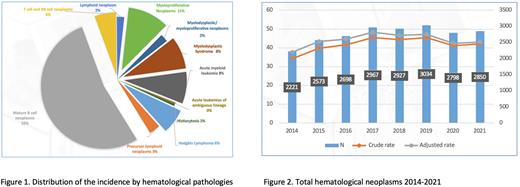Abstract
Introduction: Epidemiological incidence studies of hematological neoplasms are essential to assess health outcomes. The region of Madrid has a tumor registry called RTMAD, which collects the incidence of neoplasms in all public centers in the community. We present the impact of the COVID-19 pandemic on the data collection of this registry, as well as the main hematological diseases incidence analysis between 2014-2021.
Aims: To assess the impact of the COVID19 pandemic on the collection of the incidence of hematological neoplasms in the RTMAD registry.
Patients and Methods: A retrospective analysis of the total number of cases registered between 2014 and 2021 on the platform of the Tumor Registry of the Community of Madrid (RTMAD) of the Regional Oncology Coordination Office was performed. The data corresponds to 27 public hospitals included in this registry with a total population of 6,5 million inhabitants. To evaluate the incidence, we used the coding and the statistical methodology that appears in the RTMAD reports.
Results: During the 2014-2021 period, a total of 22,617 cases of neoplasms were collected. Comparing the preexisting registered data, a 10% reduction in the total number of reported cases (3,278 fewer cases) was observed in 2020, with a slight recovery in 2021, although not to pre-pandemic levels. Of the total number of cases, hematological neoplasms represented 8.99%. The distribution of the main hematological diagnoses is shown in a specified way in Figure 1. The incidence data in crude rate (Figure 2) are somewhat lower than those estimated for the Spanish territory as a whole in the REDECAN Report of 2021 (Med Clin; 2022, Vol 158,6, 284-209) and those from international registries (ECIS, https://ecis.jrc.ec.europa.eu; SEER,https://seer.cancer.gov/statfacts/more.html).
Conclusions: The hematological neoplasms registry in the two years of the COVID-19 pandemic has been reduced by between 8-10% compared to 2019. This underreporting could be explained by high healthcare pressure with delay or undiagnosed patients, considering that the region of Madrid had a high incidence of SARS-CoV2 infections. A more detailed analysis of these causes and their comparison with other international records including impact on survival are ongoing.
Disclosures
Jiménez-Yuste:Roche, Novo Nordisk, Sanofi, Sobi, Takeda, Grifols, Bayer, Pfizer, Spark, BioMarin, Octapharma, CSL Behring: Consultancy; Roche, NovoNordisk, Sanofi, Sobi, Takeda, Grifols, Bayer, Pfizer, Octapharma, CSL Behring: Research Funding; Roche, NovoNordisk, Sanofi, Sobi, Takeda, Grifols, Bayer, Pfizer, Spark, Octapharma, CSL Behring: Honoraria. Hernández-Rivas:BMS/Celgene: Membership on an entity's Board of Directors or advisory committees, Speakers Bureau; Beigene: Membership on an entity's Board of Directors or advisory committees; Gilead: Membership on an entity's Board of Directors or advisory committees, Speakers Bureau; Incyte: Membership on an entity's Board of Directors or advisory committees; Janssen: Membership on an entity's Board of Directors or advisory committees, Speakers Bureau; Jazz Pharmaceuticals: Membership on an entity's Board of Directors or advisory committees; Roche: Membership on an entity's Board of Directors or advisory committees, Speakers Bureau; Rovi: Membership on an entity's Board of Directors or advisory committees; Takeda: Speakers Bureau; Lilly: Membership on an entity's Board of Directors or advisory committees; AstraZeneca: Membership on an entity's Board of Directors or advisory committees, Speakers Bureau; Amgen: Membership on an entity's Board of Directors or advisory committees, Speakers Bureau; Abbvie: Membership on an entity's Board of Directors or advisory committees, Speakers Bureau.
Author notes
Asterisk with author names denotes non-ASH members.


